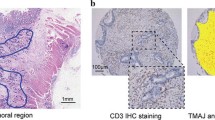Summary
To study the significance of FasL expression in immune escape of colorectal carcinoma. FasL protein expression and the number of tumor infiltrating lymphocytes (TILs) in 80 specimens of colorectal carcinoma were detected by immunohistochemitry. The mRNA of FasL was measured byin situ hybridization in the consecutive tissue slices of 80 colorectal carcinomas respectively. Using terminal deoxynucleotidyl transferase mediated dUTP nick end labeling (TUNEL0, apoptotic cells were detected in 80 specimens of colorectal carcinoma. The expression of FasL was detected in all 80 specimens, but it was not even in the same or among different tissues. In the consecutive tissue slices, the location of expression of FasL protein corresponded with that of FasL mRNA. In those with FasL extensive expression, the number of TILs was less than that of FasL weak expression (P<0.05), and the apoptotic index (AI) of TILs was higher and that of tumor cells was lower than that of FasL with weak expression respectively (P<0.01). The AI of TILs was correlated with that of tumor cells (r=−0.631,P<0.01). It was suggested that colorectal carcinoma cells can induce the apoptosis of TILs through the expression of FasL, which can counterattack the immune system. This may be one of the mechanisms of immune evasion in colorectal carcinoma.
Similar content being viewed by others
References
Nozoe T, Yasuda M, Honda Met al. Fas ligand expression is correlated with metastasis in colorectal carcinoma. Oncology, 2003, 65 (1): 83–88
Shimoyama M, Kanda T, Liu Let al. Expression of Fas ligand is an early event in colorectal carcinogenesis. J Surg Oncol, 2001, 76 (1): 63–68
Ropponen K M, Eskelinen M J, Lipponen P Ket al. Prognostic value of tumor-infiltrating lymphocytes (TILs) in colorectal cancer. J Pathol, 1997, 182 (3): 318–324
Ohta T, Elnemr A, Kitagawa Het al. Fas ligand expression in human pancreatic cancer. Oncol Rep, 2004, 12 (4): 749–754
Lim S C. Fas-related apoptosis in gastric adenocarcinoma. Oncol Rep, 2003, 10 (1): 57–63
Shukuwa T, Katayama I, Koji T. Fas-mediated apoptosis of melanoma cells and infiltrating lymphocytes in human malignant melanomas. Mod Pathol, 2002, 15 (4): 387–396
Lee T B, Min Y D, Lim S Cet al. Fas (Apo-1/CD95) and Fas ligand interaction between gastric cancer cells and immune cells. J Gastroenterol Hepatol, 2002, 17 (1): 32–38
Bennett M W, Oconnell J, Osullivan G Cet al. Expression of Fas ligand by human gastric adenocarcinomas: a potential mechanism of immune escape in stomach cancer. Gut, 1999, 44 (2): 156–162
Okada K, Komuta K, Hashimoto Set al. Frequency of apoptosis of tumor-infiltrating lymphocytes induced by fas counterattack in human colorectal carcinoma and its correlation with prognosis. Clin Cancer Res, 2000, 6 (9): 3560–3564
Author information
Authors and Affiliations
Additional information
Tong Qiang, male, born in 1978. Doctor in Charge. M. D., Ph. D.
This project was supported by a grant from foundation of “863 plan” of China (No. 2001AA218051).
Rights and permissions
About this article
Cite this article
Qiang, T., Ke, L. & Guobin, W. FasL expression in colorectal carcinoma and its significance in immune escape of cancer. J. Huazhong Univ. Sci. Technol. [Med. Sci.] 26, 79–81 (2006). https://doi.org/10.1007/BF02828044
Received:
Issue Date:
DOI: https://doi.org/10.1007/BF02828044




